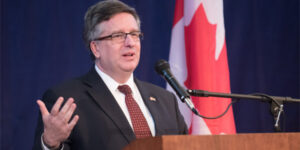Canada Week Helps Educate Albion About Neighbors to the North
April 7, 2016

Douglas George, Counsel General of Canada, spoke at Albion College April 6 and reaffirmed his country’s strong ties with the United States. “A great deal of our relationship flies under the radar. That’s because it works,” he said.
By Chuck Carlson
For Patrick McLean, director of the Gerald R. Ford Institute for Leadership in Public Policy and Service, it was a week of entertainment and enlightenment about the country to the north we know much about and understand so little.
A project that was months in the making came together April 5-6 on campus as a celebration of Canada, Canadians and the intricate, sometimes complicated, relationship America has with its northern neighbors.
On April 5, noted Canadian filmmakers Gary and Joanie McGuffin unveiled their documentary Painted Land: In Search of the Group of Seven in a public talk at Albion College; then, in its U.S. debut, the film was shown to an audience of students, faculty and community members April 6 at the Bohm Theatre downtown.
Also on April 6, Canada Counsel General Douglas George spoke at the Kellogg Center Gerstacker Commons, reaffirming the bonds between Canada and United States.
And for McLean, who began coordinating a possible “Canada Week” celebration in November, it went off without a hitch
“I’m really happy with how it went,” said McLean. “It was fantastic. As I told [Albion alumnus] Richard Wells, this is not just a one-time event, but it lays the groundwork for a long-term collaboration that really benefits our students and our institution.”
McLean, who teaches a Prentiss M. Brown Honors Program class for first-year and sophomore students this semester called Canada: More than Snow, Hockey, and Maple Syrup, was able to coordinate the events with the help of Wells, ’67, and Dennis Moore, ’70.
Wells has been a longtime friend of the McGuffins and convinced them to come to Albion to talk about and show their film that focuses on the Group of Seven, iconic landscape artists from the 1920s who have long been revered in their native Canada for showing the natural wonders of their country, especially around Lake Superior.
It was Moore, the public affairs officer for the Consulate General of Canada in Detroit, who helped bring George to Albion and deliver a 45-minute talk titled “Canada and the United States: Allies, Partners and Friends.”
Between the two events, McLean hopes a bridge of understanding has been built that will allow for more such interactions between Canada and the College.
“It was another positive aspect,” McLean said. “The students and the community really came together and both groups were very engaged in the presentation.”
A journey through time
The McGuffins’ public presentation on April 5 at Bobbitt Auditorium traced their journey to learn more about the Group of Seven—consisting of Lawren Harris, J.E.H. McDonald, A.Y. Jackson, Frank Johnston, Arthur Lismer, Frank Carmichael and A.J. Cassion. It also displayed the staggering beauty of the Lake Superior region where the artists worked and where the McGuffins have focused so much of their time and energy.
“Without art, how do we describe ourselves?” Joanie McGuffin told the crowd. “The more paintings [of the Group of Seven] we find, the more places we find, and the more places we find, the more paintings we find.”
And they urged the Albion community to take an active role in maintaining Lake Superior, the largest freshwater lake in the world.
“Albion is only five hours away,” she said simply.
A strong relationship
In introducing George, Albion President Mauri Ditzler compared the relationship between Albion College and the town of Albion to the U.S. and Canada and how easy it was to ignore each other when times were good.
“But we know we need to talk because we have economic challenges to face,” he said.
In his talk, George agreed.
“Our relationship is predominantly pleasant but good news doesn’t sell papers,” he said. “And when we do fight, we resolve it peacefully.”
George spoke at length of how the two countries are tied together in trade and economy; security and defense; environment and energy; and through shared culture and history and how the two countries are so intricately knotted together.
“Canada is your most important customer [in trade] and you’re ours,” he said. “We buy $750 billion in goods and services. We buy a lot of stuff. You sell more to Canada than the next 16 countries combined. Michigan and Ontario (the Canadian province) basically have a shared economy.”
He also mentioned how Canadians, who recently and surprisingly elected a new prime minister in the charismatic 44-year-old Justin Trudeau, are watching the U.S. presidential campaign with fascination.
“We’re watching them closely because it impacts us,” he said. “And Canadian elections matter to you because Canada matters to you. And Justin Trudeau has made relations with the U.S. his major priority.”
In the end, though, he said the relationship between Canada and the U.S. may not make a lot of headlines due to conflict or uncertainty, and that’s as it should be.
“Few countries work closer together than us,” he said. “A great deal of our relationship flies under the radar. That’s because it works.”